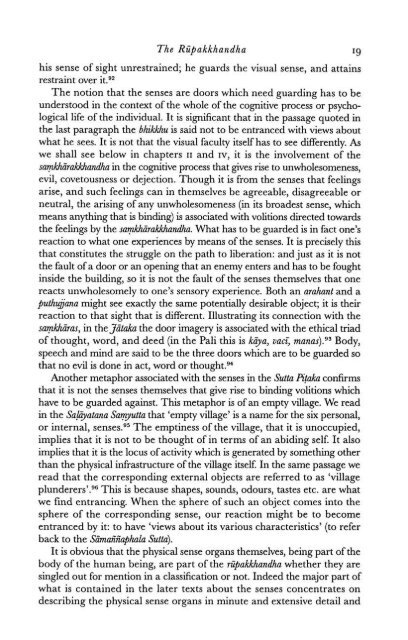Identity and Experience_Hamilton_1996
Identity and Experience_Hamilton_1996
Identity and Experience_Hamilton_1996
You also want an ePaper? Increase the reach of your titles
YUMPU automatically turns print PDFs into web optimized ePapers that Google loves.
The Riipakkh<strong>and</strong>ha I 9<br />
his sense of sight unrestrained; he guards the visual sense, <strong>and</strong> attains<br />
restraint over it.92<br />
The notion that the senses are doors which need guarding has to be<br />
understood in the context of the whole of the cognitive process or psychological<br />
life of the individual. It is significant that in the passage quoted in<br />
the last paragraph the bhikkhu is said not to be entranced with views about<br />
what he sees. It is not that the visual faculty itself has to see differently. As<br />
we shall see below in chapters 11 <strong>and</strong> IV, it is the involvement of the<br />
sa*iirakkh<strong>and</strong>ha in the cognitive process that gives rise to unwholesomeness,<br />
evil, covetousness or dejection. Though it is from the senses that feelings<br />
arise, <strong>and</strong> such feelings can in themselves be agreeable, disagreeable or<br />
neutral, the arising of any unwholesomeness (in its broadest sense, which<br />
means anything that is binding) is associated with volitions directed towards<br />
the feelings by the samhirakkh<strong>and</strong>ha. What has to be guarded is in fact one's<br />
reaction to what one experiences by means of the senses. It is precisely this<br />
that constitutes the struggle on the path to liberation: <strong>and</strong> just as it is not<br />
the fault of a door or an opening that an enemy enters <strong>and</strong> has to be fought<br />
inside the building, so it is not the fault of the senses themselves that one<br />
reacts unwholesomely to one's sensory experience. Both an arahant <strong>and</strong> a<br />
puthujana might see exactly the same potentially desirable object; it is their<br />
reaction to that sight that is different. Illustrating its connection with the<br />
samkhh, in theJitaka the door imagery is associated with the ethical triad<br />
of thought, word, <strong>and</strong> deed (in the Pali this is kiiya, vacc mana~).~~ Body,<br />
speech <strong>and</strong> mind are said to be the three doors which are to be guarded so<br />
that no evil is done in act, word or thought.g4<br />
Another metaphor associated with the senses in the Sutta Pitaka confirms<br />
that it is not the senses themselves that give rise to binding volitions which<br />
have to be guarded against. This metaphor is of an empty village. We read<br />
in the Sahyatana Samyutta that 'empty village' is a name for the six personal,<br />
or internal, senses.95 The emptiness of the village, that it is unoccupied,<br />
implies that it is not to be thought of in terms of an abiding self. It also<br />
implies that it is the locus of activity which is generated by something other<br />
than the physical infrastructure of the village itself. In the same passage we<br />
read that the corresponding external objects are referred to as 'village<br />
plunderer^'.^^ This is because shapes, sounds, odours, tastes etc. are what<br />
we find entrancing. When the sphere of such an object comes into the<br />
sphere of the corresponding sense, our reaction might be to become<br />
entranced by it: to have 'views about its various characteristics' (to refer<br />
back to the SGmaEEaphala Sutta).<br />
It is obvious that the physical sense organs themselves, being part of the<br />
body of the human being, are part of the riipakkh<strong>and</strong>ha whether they are<br />
singled out for mention in a classification or not. Indeed the major part of<br />
what is contained in the later texts about the senses concentrates on<br />
describing the physical sense organs in minute <strong>and</strong> extensive detail <strong>and</strong>


